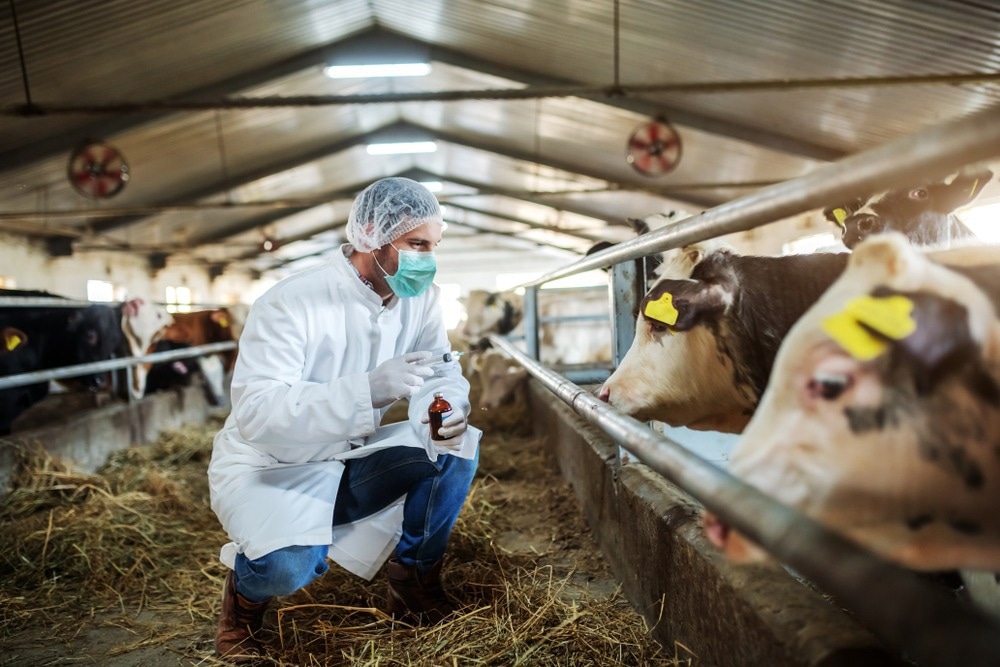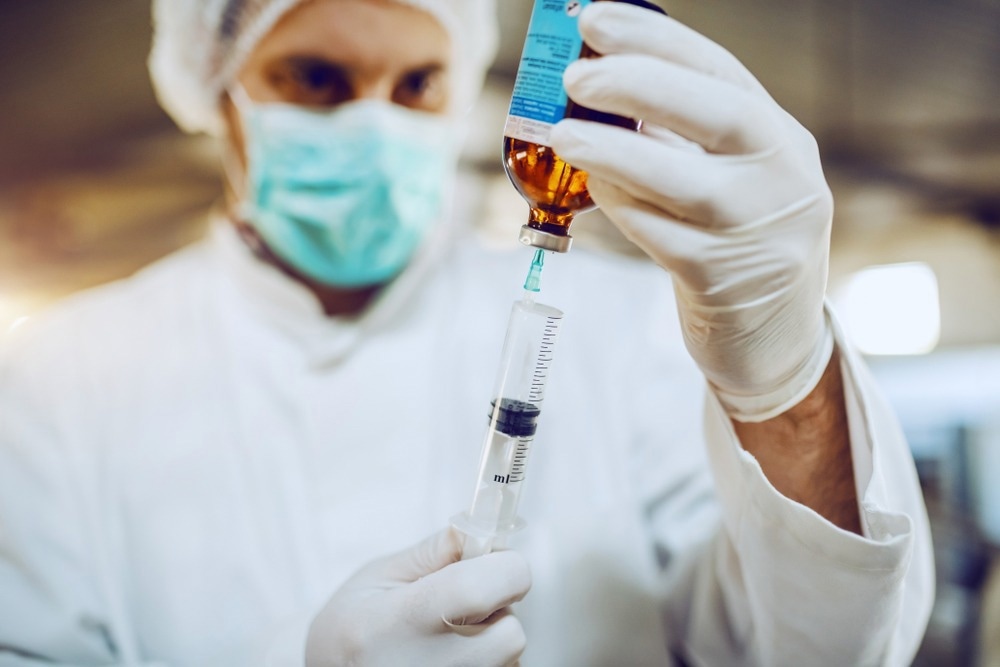
[ad_1]
Introduction
Why veterinary vaccines are important?
Types of veterinary vaccines
How can veterinary vaccines positively impact human health?
How can veterinary vaccines adversely affect human health?
References
Further Reading
The use of veterinary vaccines is growing exponentially to guard each animal well being and public well being. However, there may be proof indicating that people unintentionally uncovered to veterinary vaccines can develop opposed occasions.

Veterinary vaccines. Image Credit: Dusan Petkovic/Shutterstock.com
Why veterinary vaccines are vital?
Veterinary vaccines play important roles in defending cattle (livestock), wild animals, and pets from life-threatening ailments. The vaccines additionally cut back the necessity for antibiotics and allow the manufacturing of ample meals animals for the ever-growing human inhabitants.
The Global Rinderpest Eradication Program, which concerned veterinary vaccination, is among the greatest achievements in veterinary medication. It helped to utterly eradicate rinderpest in 2011. This is the primary animal illness to be eradicated globally.
Types of veterinary vaccines
The first-generation veterinary vaccines together with inactivated and live-attenuated vaccines have gained appreciable success in livestock and poultry industries. However, these classical vaccines include potential disadvantages. While inactivated vaccines fail to induce broad-spectrum immune responses, live-attenuated vaccines are related to the chance of illness unfold.
The disadvantages of first-generation vaccines have been addressed within the second-generation (recombinant subunit vaccines) and third-generation vaccines (DNA, RNA, viral-vector-based, and chimeric vaccines). Another novel invention is marker vaccines that contain deletion mutants of wild-type pathogens.
How can veterinary vaccines positively impression human well being?
Veterinary vaccines play equally viral roles in human well-being. The vaccines utilized in livestock and poultry assist to take care of optimum animal well being and enhance the manufacturing of meals animals. Collectively, these efforts result in an elevated provide of high-quality animal protein to the human inhabitants.
According to estimations from the United Nations, the worldwide human inhabitants is 8 billion at present in 2022. This is anticipated to achieve 9.7 billion in 2050. To meet the meals demand of the fast-growing human inhabitants, a big improve in animal meals manufacturing is critical. Veterinary vaccines play important roles in assembly this want.
Besides defending animals, veterinary vaccines cut back the chance of zoonotic ailments that soar from animals to people by way of varied routes of transmission. In developed international locations, human rabies has virtually been eradicated by vaccinating home and wild animals with rabies vaccines.
The ongoing coronavirus illness 2019 (COVID-19) pandemic is probably the most outstanding instance of accelerating human vulnerability to zoonotic ailments.
Altered anthropogenic land use, environmental deterioration, and globalized commerce and journey are the main causes of pathogen spillover from animal to human populations, resulting in the emergence of novel and lethal zoonotic ailments. The speedy growth of novel veterinary vaccines might play an important position in controlling the emergence of those ailments.
Veterinary vaccines developed towards varied pathogens (Escherichia coli and Salmonella enteritidis) assist cut back pathogen shedding from contaminated animals, and thus, cut back the chance of foodborne ailments in people.
Veterinary vaccines cut back the necessity for antibiotics which can be used to deal with infections in animals. Excessive use of antibiotics can result in the emergence of resistant micro organism in animals. Consumption of uncooked or undercooked animal meals could result in the switch of resistant micro organism from animals to people. Consumption of greens, fruits, or water which can be contaminated by animal feces may infect people with resistant micro organism. The use of vaccines to forestall an infection as an alternative of antibiotics reduces the chance of antibiotic resistance.

Veterinary vaccines. Image Credit: Dusan Petkovic/Shutterstock.com
How can veterinary vaccines adversely have an effect on human well being?
Increased use of veterinary vaccines could improve human publicity to vaccine strains, which in flip can adversely have an effect on human well being.
Many veterinary vaccines are administered to animals by way of oral or nasal (aerosol vaccines) routes. These routes of vaccine administration can put close by folks at greater threat of unintentional publicity to vaccine strains.
Many live-attenuated vaccines are at present out there for animal use. The administration of dwell vaccines to meals animals can improve the chance of human publicity to vaccine strains, which subsequently can have a adverse impression on human well being.
Elderly folks, most cancers sufferers, organ transplant recipients, human immunodeficiency virus (HIV)-infected folks, and different immunocompromised sufferers are significantly liable to creating opposed well being results following publicity to veterinary vaccine strains.
Regarding occupational publicity, veterinarians are at greater threat of publicity to dwell vaccine strains by way of needlestick accidents or open wounds, or eye splashing. Occupational publicity to veterinary vaccines may happen in folks concerned in animal and fish farming.
Studies investigating occupational publicity to veterinary biologic merchandise have indicated that unintentional autoinoculation of dwell anthrax vaccine and Brucella and Newcastle virus vaccines induces native and systemic infections in people.
One of the commonest signs associated to veterinary vaccine publicity is an allergic or inflammatory response on the web site of injection (inoculation). Adjuvants utilized in vaccine formulations are chargeable for these adversities.
There is proof indicating that unintentional injection within the joints and fingers could result in sterile joint abscesses and finger necrosis, respectively. In some circumstances, auto-injection has been discovered to trigger anaphylactic reactions that require hospitalization.
Besides unintentional publicity, folks can deliberately expose themselves to veterinary vaccines. For instance, folks typically use veterinary vaccines as prophylaxis towards sure ailments (West Nile encephalitis, Lyme illness, and anthrax) for which no human vaccines can be found.
References
[Further Reading: Vaccine ]
[adinserter block=”4″]
[ad_2]
Source link